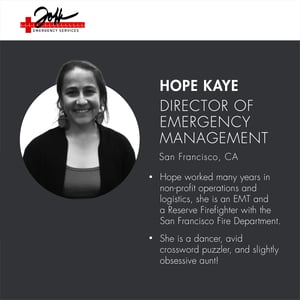2 min read
Impact of COVID 19 on Schools' Emergency Prep - Interview with Hope Kaye
![]() The Joffe Family
:
December 1, 2020
The Joffe Family
:
December 1, 2020
We sat down this week with our Director of Emergency Management, Hope Kaye. Hope has been involved in emergency services for five years, having previously worked as a firefighter reservist and an EMT before joining Joffe in May of 2019. She’s currently based in San Francisco.
Hope’s job is to Direct the Emergency Management Division of Joffe Emergency Services. Her responsibilities fall into three basic categories: Resources, Training, and Consultation. She works with schools throughout the country to ensure that they have the resources they need to understand and prepare for emergencies, the training necessary to put those resources to

work, and the support they need in a crisis through consultations both in preparation for and in response to emergency situations.
When asked how COVID 19 has impacted her daily work, Hope replied that her team’s focus has shifted to providing pandemic resources, including supporting documents that are both directly related to the virus and those that cover the handling of other emergencies in a pandemic setting. She also explained that the focus of the training she provides has moved online, which has been challenging. “We had to figure out how to build and deliver engaging virtual training,” she said, “both individually and in large groups.” She mentioned that she and her team had to figure out how to “get creative” with programs like FaceTime and Zoom to do virtual walkthroughs and assessments of schools.
She said that this shift has been a major part of the impact on schools in general, not just in terms of emergency management. Schools have had to figure out how to maintain continuity with education and other services like food, special education, physical and occupational therapy, and language support while remaining completely digital. The pandemic, Hope says, has exposed some new issues to be addressed in schools, including equal access to resources and a strained relationship between families, teachers, and school administration as everyone struggles to cope with our new normal.
“We reached an interesting point in the summer,” said Hope, “where we shifted away from thinking about [the pandemic] as an emergency to thinking about it as a new mode of operation.” Hope says that her team has worked to make a distinction between immediate emergency management, as in the case of fire, earthquakes, or other direct threats, and the looming need to mitigate COVID 19 as an issue. She focuses on finding ways to accomplish necessary safety drills while remaining safely distanced and following CDC guidelines.
Hope compared the virus to an invisible, moving target. There are many unknowns to dealing with it, and a low level of anxiety that has become present at all times. She says that there is still much to think about when it comes to what to do right now versus what to do when this is all over, and says that the more we can plan and have concrete answers, the more we can provide certainty to everyone involved, from faculty and staff to students and families, the better off we’ll be as we continue to work through this pandemic.

